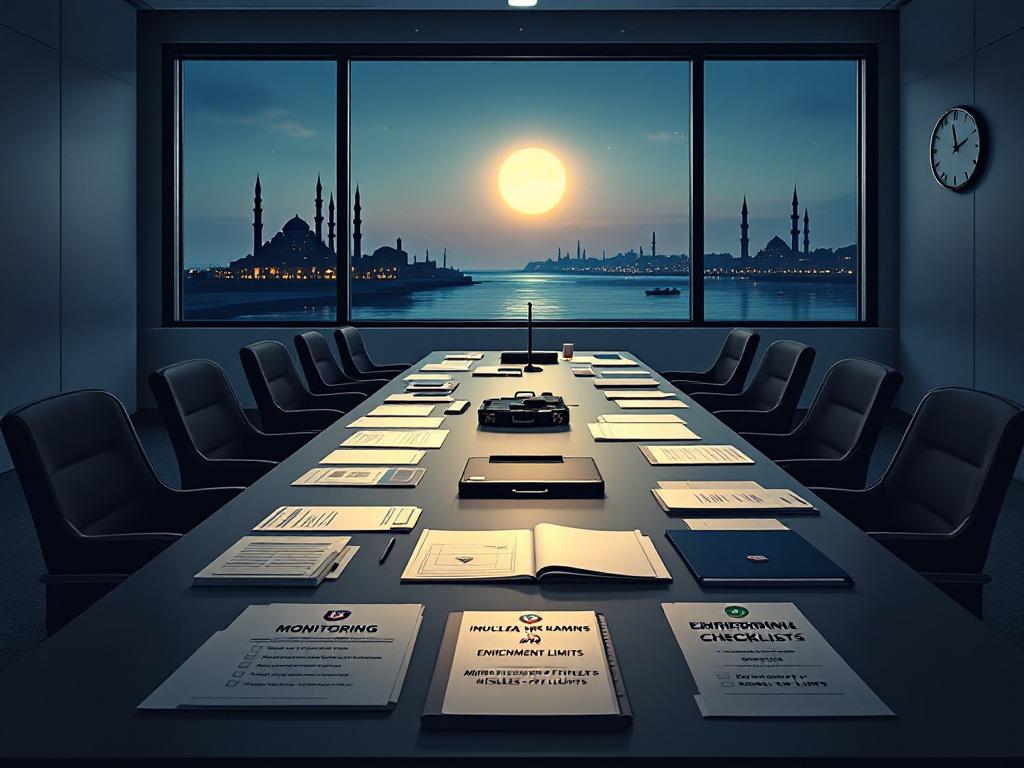Articles in this Cluster
11-04-2025
The U.S. and Iran are set to begin high-stakes talks in Oman on a potential new nuclear deal amid escalatory rhetoric. President Trump has given Iran a two-month deadline and warned of possible military action—led by Israel—if no agreement is reached, while Iran insists negotiations be indirect and rejects pressure or demands affecting its defense and missile programs. The U.S. seeks a stronger arrangement than the 2015 JCPOA, potentially including Iran’s missiles and regional proxies; Iran signals openness to measures preventing a nuclear weapon but refuses dismantling its civilian program. Envoy Steve Witkoff will participate, with officials framing the meeting as exploratory “table setting.” Tensions are heightened by Iran’s weakened regional position, Israeli strikes, and warnings from Tehran that any attack could trigger a broader Middle East war.
Entities: United States, Iran, Donald Trump, Israel, Oman • Tone: urgent • Sentiment: negative • Intent: inform
11-04-2025
US and Iranian delegations held largely indirect but “constructive” nuclear talks in Muscat, marking the first direct contact between a Trump administration official and an Iranian counterpart. Both sides described the meeting as positive and agreed to reconvene in Oman on April 19, with Iran’s foreign minister saying they came close to a framework and aim to reach an agreement quickly. The White House said envoy Steve Witkoff conveyed Trump’s directive to resolve differences via diplomacy, though Trump has set a two-month deadline and warned military action is possible if no deal is reached, with Israel likely leading any strike. Iran outlined red lines against threats and excessive demands, signaling resistance to dismantling its nuclear program beyond past JCPOA terms. While the U.S. seeks a stronger, possibly broader agreement touching nuclear, missiles, and regional proxies, Iran says talks are currently limited to the nuclear file. Economic pressure and regional setbacks have pushed Tehran to engage, but core differences over the scope and end-state of Iran’s nuclear program remain.
Entities: United States, Iran, Donald Trump, Steve Witkoff, Oman (Muscat) • Tone: analytical • Sentiment: neutral • Intent: inform
11-04-2025
A report from the Institute for Science and International Security warns that Iran’s nuclear threat has reached an “extremely dangerous” stage, citing expanded capabilities, shorter timelines to build a weapon, and growing internal support for weaponization amid regional conflicts. The report comes ahead of U.S.-Iran talks and notes Iran’s sizable drone and missile arsenals and support for Russia in Ukraine. President Trump said the U.S. will not allow Iran to obtain a nuclear weapon and signaled willingness to use military force, with Israel playing a key role. The piece also highlights doubts about an alleged Iranian fatwa against nuclear weapons and notes recent Iranian rhetoric threatening Trump.
Entities: Iran, United States, Institute for Science and International Security, Donald Trump, Israel • Tone: urgent • Sentiment: negative • Intent: warn
11-04-2025
The U.S. and Iran are set to hold nuclear talks in Oman, with Washington seeking direct negotiations and Tehran insisting on indirect talks via a third party. Analysts say both sides are posturing for leverage: Iran has advanced uranium enrichment, missile capabilities, and closer ties to Russia and China, while the U.S. wields significant economic and military pressure, including potential UN “snapback” sanctions. Trump has warned of military action and suggested Israel would lead any strike if talks fail. Experts argue a broader strategy—sanctions, countering Iran’s regional proxies, and support for Iranian civil dissent—is needed to curb Tehran’s nuclear ambitions and influence. Time pressure is mounting as key sanctions authorities near expiration in late 2025.
Entities: United States, Iran, Oman, United Nations snapback sanctions, uranium enrichment • Tone: analytical • Sentiment: neutral • Intent: analyze
11-04-2025
Iran’s Supreme Leader Ayatollah Ali Khamenei, long opposed to engaging Washington, approved nuclear talks with the U.S. after Iran’s top leaders warned that refusing could invite U.S.-Israeli strikes on key nuclear sites, trigger wider war, and endanger the regime amid a collapsing economy and domestic strains. Pressured by worsening power and water shortages, a plunging currency, potential drops in oil exports due to U.S. pressure on China, and weakened regional proxies, Khamenei authorized indirect talks—potentially direct if progress is made. Initial U.S.-Iran discussions in Oman aim to set a framework and timeline. Khamenei’s red lines include keeping Iran’s missile program off the table while allowing negotiations on strict monitoring and significant reductions in uranium enrichment; Iran also signals openness to easing regional tensions. The U.S., under President Trump, insists Iran must not obtain a nuclear weapon and seeks a broader deal than the 2015 accord, as Iran’s enrichment has advanced to 60% since that deal’s collapse. Russia and China have urged Iran to negotiate, and senior Iranian figures argued that talks are necessary to preserve the regime.
Entities: Ayatollah Ali Khamenei, United States, Israel, Oman, Donald Trump • Tone: analytical • Sentiment: neutral • Intent: inform
11-04-2025
The United States and Iran are set to hold their first high-level talks in a decade on Saturday in Oman, aiming to curb Iran’s nuclear program. Both sides signal openness to a deal but remain divided on its scope and even on whether to meet directly. The talks occur amid skepticism about Iran’s intentions and uncertainty over the format and potential outcomes.
Entities: United States, Iran, Oman, Washington Post, Iran’s nuclear program • Tone: analytical • Sentiment: neutral • Intent: inform
11-04-2025
The article reports that Donald Trump, who withdrew the U.S. from the Iran nuclear deal (JCPOA) nearly seven years ago and reimposed sanctions, has now sent an envoy to Oman to explore reviving or renegotiating aspects of the agreement. The move comes via back-channel diplomacy in Muscat, a traditional mediator, and underscores the irony and difficulty of trying to fix a deal his administration dismantled. The piece highlights skepticism about Trump’s negotiating credibility, given the original withdrawal’s fallout, Iran’s subsequent nuclear advances, and the more complex geopolitical landscape involving Europe, Russia, China, and regional tensions.
Entities: Donald Trump, Iran nuclear deal (JCPOA), Oman/Muscat, United States, Iran • Tone: analytical • Sentiment: neutral • Intent: inform
